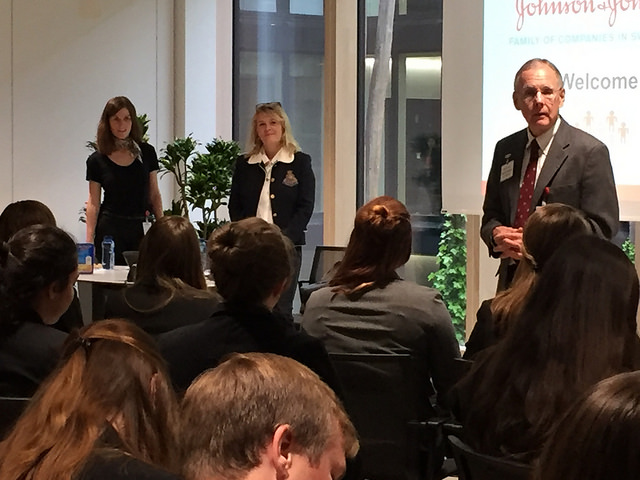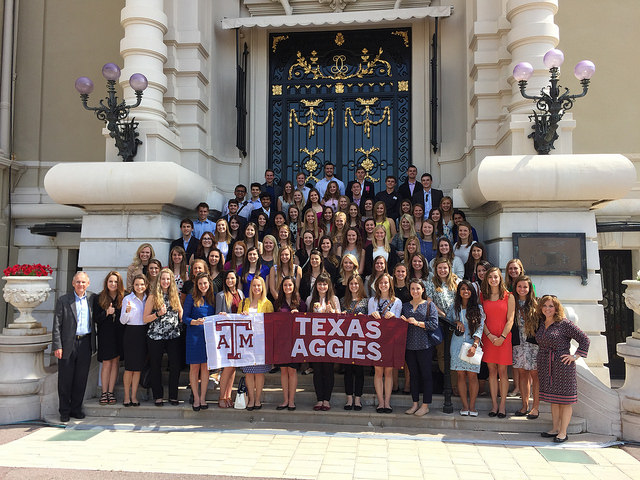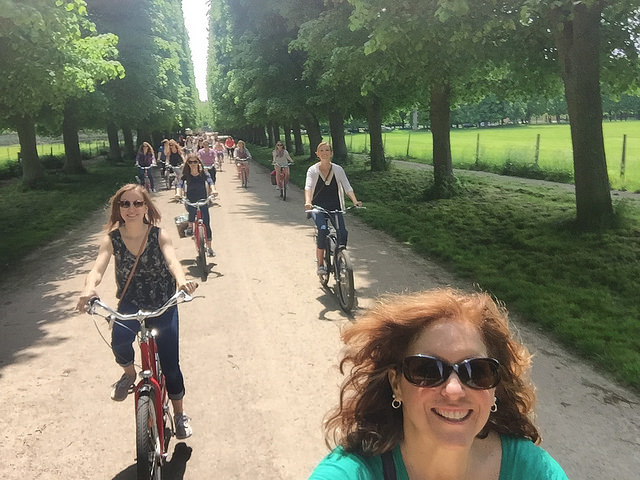Marketing study-abroad trip transforms students
June 24, 2016
|
Lisa Burton
One of the most rewarding aspects of my position as a career adviser is watching students develop personally and professionally.There have been many opportunities to witness this happening with our students first-hand while on the Marketing Study Abroad program, with which I have been able to assist for four years.
For those not familiar with this trip, 80 students travel throughout seven countries in Europe during a 28-day period. Marketing Professor Stephen McDaniel is program director.
During the trip, the students make professional and cultural  visits to gain an understanding of international business and marketing practices as well as increase cultural awareness. Days are filled with company visits that can range from a behind-the-scenes look at Harrods in London to watching customers take delivery of their new BMW in Munich. But it’s not all business. Students are also introduced to the culture and the history of the areas visited with bike tours which highlight significant landmarks and events, as well as visits to places such as the Palace of Versailles and Dachau Concentration Camp. Students who complete this course are transformed by this experience with several skills that are highly desirable to employers including creative problem solving, and increased communication and public speaking skills, among many others.
visits to gain an understanding of international business and marketing practices as well as increase cultural awareness. Days are filled with company visits that can range from a behind-the-scenes look at Harrods in London to watching customers take delivery of their new BMW in Munich. But it’s not all business. Students are also introduced to the culture and the history of the areas visited with bike tours which highlight significant landmarks and events, as well as visits to places such as the Palace of Versailles and Dachau Concentration Camp. Students who complete this course are transformed by this experience with several skills that are highly desirable to employers including creative problem solving, and increased communication and public speaking skills, among many others.
Discussion of marketing practices is a major part of the company presentations that we attend. One of the most surprising lessons for our students was that Americans are not  necessarily the most lucrative market for many European businesses. Understanding what motivates customers from countries like China and India and using targeted marketing strategies is what has made companies like Bucherer in Switzerland so successful. Learning how to appeal to lucrative segments in other markets is valuable to our students as they learn to navigate the business world in a global environment.
necessarily the most lucrative market for many European businesses. Understanding what motivates customers from countries like China and India and using targeted marketing strategies is what has made companies like Bucherer in Switzerland so successful. Learning how to appeal to lucrative segments in other markets is valuable to our students as they learn to navigate the business world in a global environment.
In addition to learning about business practices, our students had the opportunity to experience different cultures since we travel throughout Europe. People in Britain were more reserved than those in Italy. Monaco is extremely safe due to increased police presence to ensure the protection of the high net worth people who live there. In Germany, beer is considered a food. Austrians live their lives in the outdoors by hiking, skiing and enjoying the beauty and terrain of the mountains. Each country had its own identity and customs, and awareness of that was very helpful to our students. They quickly adapted to the culture of each country and learned to flourish in unfamiliar surroundings.
Watching students figure out how to invoke creative problem solving is always a highlight for me. They had to learn new transportation systems, budget for spending and food money, and cross the communication barrier successfully. Reading maps, buying groceries as opposed to eating out and learning simple phrases in each country’s native language were just a few of the ways they did this. But they not only had to communicate with people who may not speak English, they also had to educate their fellow students on highlights of each city or the companies and cultural sites we visited. The students’ ability to transform facts and details into creative presentations was amazing. We had a group that demonstrated the glass making process to replicate the work of the artisans at Riedel Glass, by using balloons! Other groups used a game-show format, skit or race. The end result was not only informative, but also entertaining.
There were several skills that were not developed, but rather demonstrated during the study abroad and those were Texas A&M’s core values of excellence, integrity, leadership, loyalty, respect and selfless service. Arranging a special prayer service, buying and giving a sandwich to a homeless person on the street, watching out for each other, listening attentively and participating for our hosts are only a few examples.
Being able to witness, guide and advise students on how to use the skills developed while on the study abroad is one of the best parts of my job. Watching them transform from cautious newcomers to confident travelers is phenomenal. They did this by experiencing and learning, and they will be able to capitalize on these skills when seeking career opportunities.



